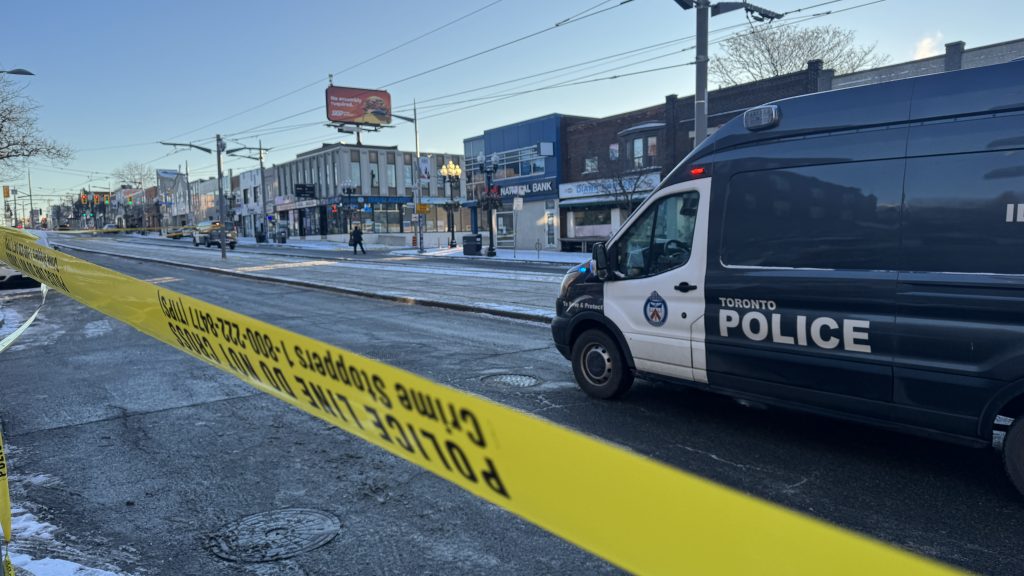Sexual health clinic aimed at treating men, trans and non-binary people to open in Toronto
Posted July 25, 2022 3:53 pm.
A new sexual health clinic to serve cis men, transgender and non-binary people in downtown Toronto is set to formally open on Tuesday.
The objective of HQ Toronto, located on Bay Street near College, is to provide a downtown destination for HIV, sexually transmitted infection and bloodborne infection testing while also being a resource for mental health, substance abuse and social health supports, all in the same place.
At HQ, testing can be completed in less than 20 minutes, and results are available in 24 hours or less.
“It’s so easy to use. And then it starts feeling like something you do over lunch, drop in, test, and head home. We will test you and send your results as soon as they’re available. And that sort of comfortable way of doing it is going to make sure that if you’ve never tested before and are a bit hesitant, [you can] start feeling like ‘I can do this,’ and feel less pressure,” explained Osmel Guerra Maynes, the director of Organizational Development, Community and Culture.
Guerra Maynes described how they use express testing rooms with a “smart mirror” virtual assistant walking each patient through each step of the testing process, whether it be throat, urine, or rectal testing before it gets dropped off at the onsite lab.
The virtual assistant provides instructions in six different languages as well. For those who don’t have an Ontario health card, an HQ-specific card will be provided, making the clinic accessible for those with don’t have OHIP, including newcomers.
“We’re able to provide folks with a sense of stability where they can come in and know that ‘Hey, I’m going to a space where I’m going to get completely supported,'” he added.
“People coming here haven’t always had positive experiences accessing health care,” explained Guerra Maynes.
“They’re going to be coming here and getting testing [in a place] that have staff who know where they’re coming from. We have staff who reflect the folks that are using the space. And that’s what’s going to make it so like a homey style because you’re coming to a space where the folks working here know exactly who you are and have gone through the same processes.”
Director of Mental Health for the clinic, Dr. Tim Guimond, said it was important to them to provide that link between physical and mental health.
“If you’re mentally well, keeping your physical health is easier. [Sexually] if you feel that you’re taken care of and feel supported, it probably helps relieve some of that anxiety. So we want to make sure these things, we deal with them together.”
It allows those who work at HQ to potentially provide these services to someone who might have only come in for a particular reason.
“How do we make sure when [someone] comes in and during a sexual health visit, we realize you’ve been struggling with thoughts of ending your life supports a deeper anyway. If you come to the substance use care program and we realize that you’ve never had an HIV test. What’s gotten in the way let’s talk about that emphasis delighted to be with you. We can ensure we guide you through the process,” said Dr. Guimond.
It also allows them to provide that support after hearing test results.
“It’s important because it allows folks to understand it’s okay. It’s okay that once you receive [news], whether it’s good news or bad news, because [there are] services that will enable you to navigate the world after that,” said Guerra Maynes.
“And with cooperation and social health, it allows folks to understand, ‘Okay, well, it doesn’t end here. It continues moving forward.'”
Dr. Guimond said they already have between 20 to 30 people working at the clinic on the sexual health side, mental health side and in the lab.
They also have community partners, including the Centre for Addiction and Mental Health (CAMH) and Action Positive, that bring staff to run programming, as well as from organizations focused on more communities that help those who use the clinic and those treating them.
“We know, [for example], that for Indigenous people to feel comfortable, we need to make sure that we’re approaching health from that holistic direction, and we have built facilities so that we can have a ceremony here so that people can engage in their full wellness,” explained Dr. Guimond.
“Not only do we have the staff here, and we’re attempting to hire diverse staff, but also the partners that come in that represent specific communities that can speak to the experience.”
They’ll also be running group sessions on trauma, emotion dysregulation, depression and anxiety. The clinic can also provide mental health supports, in-person or virtually, as Dr. Guimond says there may be people outside the GTA who need to access these services.
Clinic shifting to treating monkeypox as well
As of July 21, there are 288 confirmed cases of monkeypox in Ontario, over 75 per cent of which have been reported by Toronto Public Health.
Dr. Guimond said they’ve been able to shift some of their resources towards diagnosing monkeypox in light of the outbreak. All cases, except for one, have been detected in men.
“Because of the monkeypox outbreaks, we’ve created isolation rooms … so this means that if somebody comes in and we suspect that, you can assess them.”
They also will soon be able to administer the monkey pox vaccine.
“We know that men in our community are coming forward, worried about being exposed and needing to be checked. And so we wanted to make sure that they knew that we have a place here, and by having a separate isolation room, it just means that if they have an open sore, that we’re able to clean up and make sure that it doesn’t transmit to anyone else,” shared Dr. Guimond.
“We’re in a community that doesn’t get those kinds of responses. We can make those changes as soon as we try to bring the information in and make sure that that means there are services for the community as fast as possible,” expressed Dr. Guimond.
Dr. Guimond said their main goal is to provide a space that is sex-positive and comfortable for all those who enter the building.
“Day by day, same space, I think that’s what we need to do. And it’s exciting,” shared Dr. Guimond.
“To be in this space as a health facility … whether you [think it’s] inappropriate to talk about mental health struggles or it’s inappropriate to talk about sex, you’re in an environment where we’re happy to talk and to talk privately or if you want to talk in groups so that people can start normalizing the conversations.”
The clinic, which is funded in part by the Ontario Ministry of Health and through donations, officially opens on Tuesday at 790 Bay Street, but Dr. Guimond said they have not turned anyone away and have started to treat some patients already.








